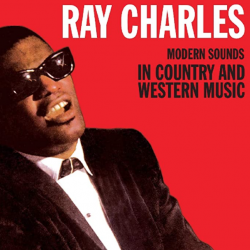 Ray Charles was one smart son of a gun. He’d conquered the RnB world during the 1950s, despite his own blindness and American society’s overt racial barriers. But he knew there was beauty and versatility in the simple country songs that were part of his childhood soundtrack and remained immensely popular. Added to that was a vast, untapped market of white listeners who wouldn’t (be allowed to) entertain RnB, but happily lapped up new and old country sounds. When Ray switched from black focussed Atlantic records, to the more broadly commercial ABC, he and his new label foresaw such untapped potential. The record was a huge success in both the pop and RnB charts, quickly securing half a million sales and a Grammy for ‘I Can’t Stop Loving You’. Ray even released an equally popping ‘Modern Sounds – Volume Two’ later that same year.
Ray Charles was one smart son of a gun. He’d conquered the RnB world during the 1950s, despite his own blindness and American society’s overt racial barriers. But he knew there was beauty and versatility in the simple country songs that were part of his childhood soundtrack and remained immensely popular. Added to that was a vast, untapped market of white listeners who wouldn’t (be allowed to) entertain RnB, but happily lapped up new and old country sounds. When Ray switched from black focussed Atlantic records, to the more broadly commercial ABC, he and his new label foresaw such untapped potential. The record was a huge success in both the pop and RnB charts, quickly securing half a million sales and a Grammy for ‘I Can’t Stop Loving You’. Ray even released an equally popping ‘Modern Sounds – Volume Two’ later that same year.
The running order alternates between tracks showcasing Ray’s proven, kicking big band sound, and arrangements featuring slick Hollywood strings (essentially for the white audience’s tastes). In truth, the RnB sounds are comfortably the best. Opening with the Everlys’ ‘Bye Bye Love’, an arrangement full of brass and sass that veritably explodes into life. ‘You Don’t Know Me‘ (Eddy Arnold) is sweeter than sweet in orchestration, which let Ray’s soulful croon take flight. ‘Born To Lose’ had been previously recorded by country music’s everybody and his wife, but Ray took it to another level. It’s probably the best of the ‘orchestrated’ tracks on the record, the sadness of the violins counterpointing Ray’s lonely, soft vocal. On side two Old Hank gets a thorough song workout, with a flying RnB version of ‘Hey Good Lookin” and those slick movie strings accompanying Ray on ‘You Win Again’
The record was a counterpoint to the fight for racial equality, laid acutely bare during the early 1960s. in the southern States. Ray’s black fans were happy to share him with a new, white audience. Music was starting to build bridges, as they say, between artificially divided parts of society. Kudos to Ray.



Great choice and while we can still enjoy the music, I don’t think it is possible to fully appreciate now just how revolutionary it must have seemed at the time. A ground-breaking album that influenced multiple genres.
Amen to that. It must have blown quite a few minds.